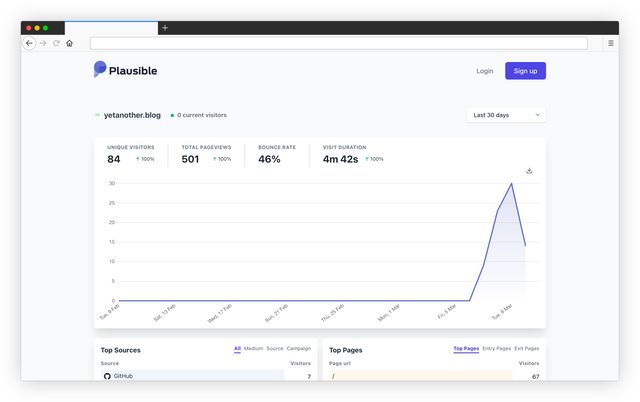Why we don’t use Google Analytics anymore
When we started this blog last year, we made a list of things we have to do for the launch. Our list included a rough design concept, a logo, avatars for social media, and all the legal requirements. We live in Europe, so dealing with privacy and cookie policies, legal details, and, the most annoying feature of all time, cookie law banners felt pretty natural. It did feel like a common feature set we have to follow. Part of this feature set was also Google Analytics. We wanted to have some basic metrics about our website, so our decision felt straightforward.

Mixed feelings #
Google Analytics is just set for all kinds of websites, for personal websites as well as for websites at scale. At that time, we didn’t question it. Also, and most importantly, it’s for “free”. Our blog is a side project, so keeping the costs down was very critical for us.
But over the last months, we started questioning our decision, with scandals in mind like Cambridge Analytica, eye-opening documentaries like The Social Dilemma, and the episode of The Changelog with the creators of Plausible.
After the podcast, I understood, that we are responsible for our website and visitors. This one minute it took us to include the JavaScript snippet, had a huge impact on our visitors. Without really giving them a choice, we sold their data to one of the biggest companies in the world. And why did we do it? Because we want to see simple metrics like page views or referrals. Is that responsible action?
The era of alternatives #
The great thing is that, with all the discussions about data, we also see great alternatives popping up. Hosting providers like Netlify or Vercel offer analytics tools, but we also see independent solutions like Plausible. We don’t rely on Google Analytics anymore, but we have to live with one fact: The tools are not for free. And that’s new to us as we got used to the fact, that many online services are for free. And by free we always mean using our data as a currency to pay for those services. Nothing is wrong with that, but we have to answer the question of whether we want to spend money because we want to be the real customers or just the by-products of ad networks. When it comes to analytics, we decided to pay for a service, to protect our visitors and provide the best experience we can.
Cool side effects #
Besides selling less data, the greatest advantage is also the ability to get rid of the cookie law banner. Isn’t it annoying to click on those banners over and over again every time we open a new page? I deeply believe the intention is good, it’s good to inform us and being more transparent, but it certainly didn’t make the internet more user-friendly. With the switch to Plausible, we don’t set cookies anymore, so we also don’t need a cookie law banner. You can just go to our website and enjoy our content. Also, Plausible’s JS snippet is way smaller (~1,34 KB), so we could even improve the performance of our website.

In addition to that, our experience got way better, too. Honest question: Do you really like the Google Analytics experience? Do you enjoy diving into your stats? Probably not. We included Google Analytics, but we never checked it because the console has thousands of complex views, navigations, options, and whatsoever. With Plausible, we just have a simple dashboard with a bare minimum set of metrics (btw our dashboard is publicly available).
I'd like to mention, that we also tested Netlify’s analytics offering and all the benefits we described here for Plausible also apply to them. We also loved the experience, but Plausible is a bit cheaper for us, so we just made a pragmatic decision.
Take away #
This blog post could be interpreted as a simple Google rant, but that’s not my intention. I want to encourage you to re-think the usage of Google Analytics. Maybe you have good reasons to use it, or you enjoy the experience. But maybe you don’t. Maybe you have the same mixed feelings we had in the last months. I want to encourage you to try out other tools. For a better, privacy-friendly, faster and fairer web.